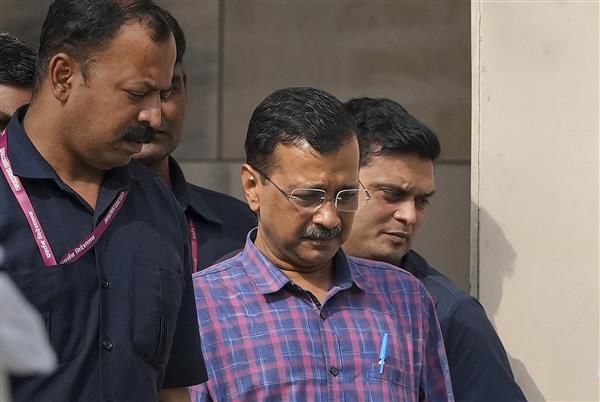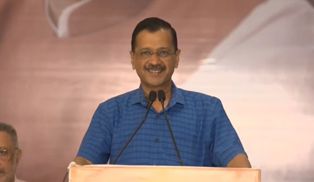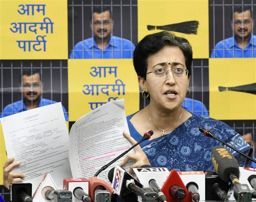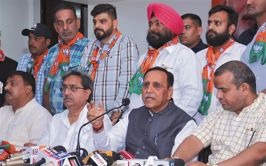
Arvind Kejriwal. PTI file
Satya Prakash
New Delhi, April 30
The Supreme Court on Tuesday questioned the Enforcement Directorate on the timing of Delhi Chief Minister Arvind Kejriwal’s arrest in a money-laundering case linked to the Delhi excise policy scam ahead of the 2024 Lok Sabha election.
While hearing Kejriwal’s petition challenging the Delhi High Court’s April 9 verdict upholding his arrest by the ED, a Bench of Justice Sanjiv Khanna and Justice Dipankar Datta posed five questions to Additional Solicitor General SV Raju, representing the probe agency, raised by the Delhi Chief Minister in his rejoinder affidavit.
The ED had arrested Kejriwal on March 21 after the Delhi High Court refused to grant him protection from coercive action by the probe agency in the money-laundering case. The Delhi High Court had on April 9 dismissed Kejriwal’s petition challenging his arrest by the ED, saying there was no violation of law as there was “enough material” which justified his arrest.
On Saturday, Kejriwal had told the Supreme Court that his arrest by the ED in the case was a classic case of a ruling party misusing probe agencies to crush its biggest political opponent -- AAP and its leaders -- even as the ED described him as “the kingpin and key conspirator of the Delhi excise scam”.
On behalf of Kejriwal, senior counsel Abhishek Manu Singhvi asserted that no trace of proceeds of crime had been found and there was no proof of his direct involvement. “Possession of even unaccounted property acquired by legal means will not constitute proceeds of crime," he submitted.
Noting that life and liberty were exceedingly important, the Bench asked Raju to come prepared with answers to the five queries, including the one on the timing of the arrest and the gap between initiation of proceedings against him and his arrest.
After hearing Singhvi’s arguments that termed Kejriwal’s arrest as illegal, it sought to know if without there being adjudicatory proceeding; the ED could initiate criminal proceedings in terms of the top court’s rulings in Pankaj Bansal versus Union of India and Vijay Madanlal versus Union of India.
“There are no proceedings of attachment in this case so far, and if there are, then show us how the petitioner is involved,” the Bench said.
In Madanlal’s case, the top court had upheld the provisions of the PMLA but that verdict is under review while in Bansal’s case, it ruled that the ED must supply in writing the grounds of arrest to the PMLA accused.
Noting that in co-accused Manish Sisodia’s case there were findings in favour and against, the Bench asked the probe agency to explain “where does the Kejriwal case lie?”
It also asked the ASG to address it on the argument that the threshold of Section 19 of Prevention of Money Laundering Act (PMLA) -- which put onus on the prosecution; and not on accused; is fairly high and thus asking for regular bail does not happen as they are confronted with Section 45 and onus shifts on them.
“So how do we interpret it? Do we make the threshold much higher and ensure that the standard is the same to find the person who is guilty?” it asked.
Section 19 of the PMLA empowers authorised ED officials to arrest a person based on the material in their possession, providing a reasonable basis to suspect that the individual concerned has committed an offence punishable under the Act.
Section 45 of the Act says that an accused can’t be released on bail unless the Public Prosecutor has been given an opportunity to oppose the bail plea and if the Public Prosecutor opposes the bail application, the court can grant him bail only if it’s satisfied that there are reasonable grounds for believing that he is not guilty of such offence and that he is not likely to commit any offence while on bail.
The ED has told the top court that his conduct in avoiding interrogation despite nine summonses led the investigating officer “to form the satisfaction” that he’s guilty of money-laundering.
The probe agency alleged that the AAP was the “major beneficiary” of the proceeds of crime generated in the Delhi excise policy scam and the party committed the offence of money-laundering through its national convenor Kejriwal.
However, Kejriwal countered the ED’s allegations, saying, “There is no specific role or act under Section 3 PMLA established to even hold the petitioner liable vicariously.”
Join Whatsapp Channel of The Tribune for latest updates.
#Arvind Kejriwal #Enforcement Directorate #Lok Sabha #Supreme Court




























